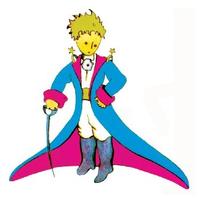El Principito, CAPÍTULO 9 - The Little Prince with Audio
by Antoine de Saint-Exupéry
from https://albalearning.com/audiolibros/exupery/elprincipito01.html
Creo que el principito aprovechó la migración de una bandada de pájaros silvestres para su evasión.
|||||||||||||||escape
Ich glaube, dass der kleine Prinz den Zug eines wilden Vogelschwarms für seine Flucht nutzte.
I believe that the little prince took advantage of the migration of a flock of wild birds for his escape.
La mañana de la partida, puso en orden el planeta.
The morning of departure, he put the planet in order.
Deshollinó cuidadosamente sus volcanes en actividad, de los cuales poseía dos, que le eran muy útiles para calentar el desayuno todas las mañanas.
Chimneyed|||volcanoes||||||owned|||||||||||||
He carefully swept his active volcanoes, of which he owned two, which were very useful for heating his breakfast every morning.
Tenía, además, un volcán extinguido.
It also had an extinct volcano.
Deshollinó también el volcán extinguido, pues, como él decía, nunca se sabe lo que puede ocurrir.
||||extinct|||||||||||
He also swept the extinct volcano, because, as he said, you never know what can happen.
Si los volcanes están bien deshollinados, arden sus erupciones, lenta y regularmente.
||||||||eruptions|slow||
If the volcanoes are well cleared, they burn their eruptions, slowly and regularly.
Las erupciones volcánicas son como el fuego de nuestras chimeneas.
||volcanic|||||||
Volcanic eruptions are like the fire in our chimneys.
Es evidente que en nuestra Tierra no hay posibilidad de deshollinar los volcanes; los hombres somos demasiado pequeños.
||||||||||clean||||men|||
It is evident that on our Earth there is no possibility of chimney sweeping the volcanoes; We men are too small.
Por eso nos dan tantos disgustos.
That's why they give us so many dislikes.
El principito arrancó también con un poco de melancolía los últimos brotes de baobabs.
The little prince also plucked up the last baobab shoots with a bit of melancholy.
Creía que no iba a volver nunca.
I thought I would never return.
Pero todos aquellos trabajos le parecieron aquella mañana extremadamente dulces.
But all those works seemed extremely sweet to her that morning.
Y cuando regó por última vez la flor y se dispuso a ponerla al abrigo del fanal, sintió ganas de llorar.
||watered|||||||||||||||felt|||
And when he watered the flower for the last time and prepared to put it in the shelter of the lamp, he felt like crying.
—Adiós —le dijo a la flor.
—Goodbye —he said to the flower.
Esta no respondió.
She did not respond.
—Adiós —repitió el principito.
—Goodbye —the little prince repeated.
La flor tosió, pero no porque estuviera resfriada.
The flower coughed, but not because it had a cold.
—He sido una tonta —le dijo al fin la flor—.
"I was a fool," the flower finally told him.
Perdóname.
Forgive me.
Procura ser feliz.
Try to be happy.
Essayez d'être content.
Se sorprendió por la ausencia de reproches y quedó desconcertado, con el fanal en el aire, no comprendiendo esta tranquila mansedumbre.
|surprised|||||accusations|||disconcerted|||||||||||gentleness
Er war überrascht über das Fehlen von Vorwürfen und war verblüfft, mit der Laterne in der Luft, diese stille Sanftmut nicht zu verstehen.
He was surprised by the absence of reproaches and was taken aback, with the lantern in the air, not understanding this quiet meekness.
Il fut surpris par l'absence de reproches et fut pris de court, la lanterne en l'air, ne comprenant pas cette douceur tranquille.
—Sí, yo te quiero —le dijo la flor—, ha sido culpa mía que tú no lo sepas; pero eso no tiene importancia.
"Yes, I love you," said the flower, "it was my fault that you don't know; But that does not matter.
Y tú has sido tan tonto como yo.
And you have been as foolish as me.
Trata de ser feliz.
Try to be happy.
Y suelta de una vez ese fanal; ya no lo quiero.
||||||lantern||||
And release that dream once and for all; I do not love you anymore.
Et lâchez aussitôt cette lanterne; Je ne t'aime plus.
—Pero el viento...
-But the wind...
—No estoy tan resfriada como para... El aire fresco de la noche me hará bien.
"I'm not so cold as to ... The cool night air will do me good."
Soy una flor.
I am a flower.
—Y los animales...
—Será necesario que soporte dos o tres orugas, si quiero conocer las mariposas; creo que son muy hermosas.
– Ich muss zwei oder drei Raupen unterstützen, wenn ich die Schmetterlinge kennenlernen will; Ich finde sie sehr schön.
—It will be necessary for me to support two or three caterpillars, if I want to know the butterflies; I think they are very beautiful.
Si no ¿quién vendrá a visitarme?
If not, who will come to visit me?
Tú estarás muy lejos.
You will be far away.
En cuanto a las fieras, no las temo: yo tengo mis garras.
||||beasts|||||||
As for the beasts, I do not fear them: I have my claws.
Y le mostraba ingenuamente sus cuatro espinas.
|||naively|||
And it naively showed him its four thorns.
Luego añadió:
Then he added:
—Y no prolongues más tu despedida.
||prolong|||
"And don't prolong your farewell any longer."
Puesto que has decidido partir, vete de una vez.
|||||go|||
Since you have decided to leave, go at once.
La flor no quería que la viese llorar: era tan orgullosa...
||||||saw||||
The flower did not want to see her cry: she was so proud ...

